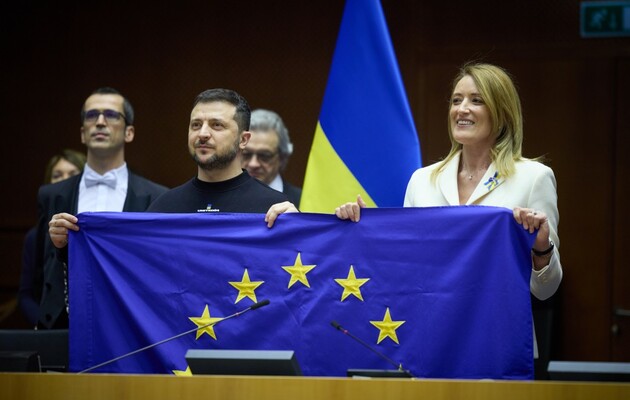How Ukraine Can Join the EU Faster: Several Things You Need to Know

The main purpose of Volodymyr Zelenskiy’s visit to Brussels on February 9 is to discuss with the leaders of the EU member states and the heads of European institutions arms supply, financial support and bringing the Russian Federation to justice for war crimes. But another important aspect is that it was not only Zelenskiy’s first visit to the EU capital since the beginning of the full-scale invasion of the Russian Federation, but also the first visit of the president of Ukraine as a candidate country for EU membership.
Ukraine is gradually moving towards membership in the European Union and learns firsthand various elements of the bureaucratically and technically complex methodology of EU accession. The Ukrainian authorities are hopeful that Ukraine will be able to complete this process very quickly and become a member of the EU within two years. Meanwhile, the heads of European institutions are not that optimistic in discussing the time frame of Ukraine’s accession and emphasize that the procedure does not provide for precise chronological limits of various stages, and the speed of accession depends on the achievements (pace and quality of reforms) of the candidate country.
Recall that the joint statement following the results of the EU–Ukraine summit does not mention the deadline for the start of negotiations on accession, instead, there is another important element, the European Commission’s promise to provide Ukraine with its preliminary assessment of the seven recommendations this spring, that is, before the publication of the final report in autumn. President of the European Council Charles Michel for his part pledged that he would contribute to the decision of the member states regarding the further advancement of Ukraine on her way to joining the EU in accordance with the report of the European Commission. As you can see, European officials, on the one hand, do not discuss the quick accession of Ukraine, instead they shift the focus to the quality of Ukrainian reforms and the procedures by which Europeans are guided when making decisions about EU enlargement. However, on the other hand, European institutions seem ready to help Ukraine move towards accession faster, either by pointing out the reforms that need to be completed, or by avoiding delays with one or another decision. So, if the European Commission positively assesses the progress of reforms in Ukraine under 33 chapters of the EU acquis, there is a chance that the European Council will decide to start negotiations with Ukraine already in the fall of 2023. Therefore, it is worth considering in more detail what the reports of the European Commission are and why its assessments are important.
The reports of the European Commission on the readiness of the candidate country to fulfill the obligations of the EU member are crucial documents in the accession. On the basis of these records, the European Council unanimously decides on further steps in the accession procedure, including opening of talks, beginning of negotiations on a certain cluster of chapters of EU law, completion of accession negotiations. The report, handed over to the Ukrainian side during the EU–Ukraine summit, is the European Commission’s first assessment of the compliance of Ukrainian legislation with the EU acquis. Prior to that, the European Commission annually assessed Ukraine’s progress exclusively in the implementation of the Association Agreement (AA), which also provided for the implementation of part of the EU acquis.
According to preliminary monitoring data of the Ukrainian Centre for European Policy (UCEP), as of the end of 2022, the overall progress of Ukraine’s implementation of the Association Agreement is almost 55 per cent, of which perfect implementation (when the obligation is fully fulfilled) equals 30.6 per cent. The Association Agreement, however, does not cover all sections of EU law, and therefore the progress of Ukraine’s implementation of the AA is small against the background of more than 14,000 legal acts and 9,000 decisions of the Court of Justice of the European Union. The average score of the European Commission is 2.16 (not including the score for chapter 23 “Judicial System and Fundamental Rights”) out of 5 possible, and the total score for all chapters is 69 out of 160, excluding chapter 23. Ukraine did not receive a score of “5” in any sector, but this level is really difficult to achieve at the application stage, instead a “4” can be enough to complete negotiations on a separate section, so this score is the optimal level for us. According to the analysis of the European Commission, Ukraine has a good level of preparation, which in numerical equivalent is equal to “4”, only in the sectors of energy, customs union, external relations and foreign, security, and defense policy.
For comparison, the countries that are currently in the negotiation process with the EU have a total score from the European Commission of at least 80. The European Commission evaluates the implementation of EU legislation in North Macedonia and Albania, countries with which negotiations on accession began last summer, at the level of a total score 97 and 84.5, respectively.
In general, the assessment of the European Commission means, firstly, that Ukraine faces a great scope of work on the implementation of EU legislation, which will require a high level of personnel and institutional capacity. Secondly, in order to achieve full readiness for membership, Ukraine cannot cut the pace and quality of reforms – the European Commission monitors the approach of legislation every year and can lower the assessment in case of setbacks, which will slow down joining the EU.
Now it is worth focusing on chapter 23 “Judicial System and Fundamental Rights” of the EU acquis. The European Commission undertakes to provide an opinion on this area in the spring, primarily assessing Ukraine’s implementation of the seven recommendations. Thanks to this, our country will be able to finalize work on the comments of the European Commission and show a favorable result of the reforms in the fall of 2023, when the EU leaders will decide on the possible opening of accession negotiations. Progress in the area of the judiciary and fundamental reforms is key to the opening of negotiations, as the cluster of fundamental reforms (which also covers chapters 24 “Justice, Freedom, Security,” 5 “Public Procurement,” 18 “Statistics,” 32 “Financial Control”) opens first. Until the candidate country fulfills the requirements of the European Commission in this area, negotiations on any of the chapters of the EU acquis will not begin, even if the country reaches a high level of readiness for membership.
Therefore, by providing Ukraine with an assessment of the implementation of reforms this spring, the European Commission will facilitate the opening of negotiations with the EU already this year, but whether this will become a reality depends on Ukraine. So far, the EU has not reported discussing any changes to the formal EU enlargement procedure, but it seems that the European Commission and the Council of the EU can contribute to speeding up this process where possible (remember the relatively quick decision of the EU to grant Ukraine the status of a candidate country).
Note that Kyiv is also planning steps that could speed up Ukraine’s accession to the EU. The idea of self-screening is a sound one because it will provide an opportunity to outline a detailed plan of tasks that will need to be completed in each area. Theoretically, if the Ukrainian authorities start working on the implementation of European norms even before the official start of accession negotiations, Ukraine will be able to complete the negotiations faster. But at the moment there is no detailed understanding of all the sectors, which new obligations we will have to fulfill. There are only approximate assessments by experts – for instance, in technical regulation sector, within the framework of the Association Agreement, we had the obligation to adopt 27 technical regulations (25 have already been implemented), and within the framework of the entire European legislation, we will have to pass more than a hundred new regulations.
Another appropriate idea is the development of the Action Plan for Ukraine’s integration in the EU internal market for 2023–24. Such a plan should include measures that will help Ukraine to further integrate in the European market, considering the destruction caused by the war. Meanwhile, it is important not to include certain sectors in this plan due to their unpreparedness to meet European requirements now, as well as due to the consequences of the war. For example, in the EU, in the field of “State Aid,” any state assistance to enterprises is prohibited, with certain exceptions. This is done in order for the business to operate on competitive terms. At the moment, Ukrainian business is operating in difficult conditions, and taking away state aid, given the fact that investments are unlikely to come to us during the war, would be an unreasonable step. Our team is finalizing the preparation of a document in which we have identified the areas where such integration can be carried out, as well as highlighted those sectors within which such integration is problematic. In our opinion, integration in the EU market is a long-term process, in fact the same as acquiring membership. With this in mind, we have proposed so-called quick wins in selected sectors that will help our country overcome the consequences of the war.
The European Commission’s report on Ukraine’s readiness for EU membership has made it clear how much work still needs to be done. We welcome that for Kyiv this document became a guide for further steps for approximation of the legislation to the EU acquis. Joining the EU is a complex and bureaucratic procedure. We should understand this and never lose determination to qualitatively implement the necessary reforms.
Please select it with the mouse and press Ctrl+Enter or Submit a bug














 Login with Google
Login with Google